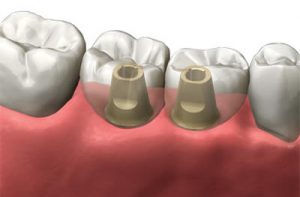Rear Teeth & Suitability Of Dental Implants
Implants make excellent tooth replacements for any teeth but with particular advantages at the back of the mouth
 Some of you reading this will hopefully have also read about the benefits of dental implants in our previous blogs. This method of replacing missing teeth is becoming increasingly popular and more and more people are asking about them at our Ipswich dental clinic when they have lost a tooth.
Some of you reading this will hopefully have also read about the benefits of dental implants in our previous blogs. This method of replacing missing teeth is becoming increasingly popular and more and more people are asking about them at our Ipswich dental clinic when they have lost a tooth.
Most people probably consider implants when they have lost a tooth that is visible when they smile. Dentures could be used as a replacement of course, but potential movement of them could be very obvious when talking for eating for example. Fortunately, dental implants offer a much more stable option.
It isn’t just the fact that implants offer a natural looking replacement tooth; they also provide a great deal of strength and durability and this is why we often recommend them to patients who have lost a rear tooth, also known as molars, rather than dentures. In today’s blog, our Foxhall Dental Clinic team discusses why this is advantageous.
Do you need to replace missing molars?
This is a question that we are sometimes asked by patients who have to have a rear tooth extracted. Because of their lack of visibility, some patients might decide to ‘do without’ them as no one sees them anyway. Although this is understandable, it really isn’t a good idea and can actually cause harm to your remaining teeth.
The main issue is that our rear teeth do a lot of the hard work of breaking food down and chewing it. Especially with harder foods, this requires a significant amount of force, which a healthy rear tooth is designed to do. Problems arise though when these teeth are absent and the food has to be broken down by other teeth that are not designed for this purpose.
This can often cause premature wearing as well as breakages in some instances. By replacing your missing rear teeth with a robust implant alternative, you can help keep the rest of your teeth healthy by avoiding unnecessary stresses upon them.
Dentures?
Traditionally, dentures have been used for this but their periodic lack of stability can prove to be problematic when eating, especially where the food is harder. This often leads to people limiting what they eat to foods that are easy to chew. This can remove quite a lot of enjoyment when eating, and especially where a ‘difficult’ food has been cooked and presented to you by a host. You are then left with a choice of struggling to eat it or feeling embarrassed by the need to explain why you can’t. With dental implants, these problems don’t exist.
A strong bite
As mentioned previously, our rear teeth provide a great deal of force in order to chew and break down our food. This level of force can pose significant challenges for dentures, but with dental implants, this is not the case. Once fully integrated into the jawbone, implants are strong, secure and stable and can withstand any force that a healthy natural tooth can (and possibly more). This means that you can choose to eat food based on what you want to eat rather than what you think your replacement teeth might be able to withstand.
No bone loss
When a tooth is lost a process called ‘bone reabsorption’ takes place. This involves the body utilising the minerals in the area of the tooth loss and the bone in that area gradually disappears. This can have an effect on the shape of your face and also cause movement of other teeth. Eventually, this can lead you to suffer from crooked and uneven teeth.
With teeth implants, this does not happen nearly as much. The artificial tooth root that is placed into the jawbone helps to prevent this from happening as the bone needs to hold the implant securely in position.
Durability
In addition to providing a high degree of strength, your new implants should be long lasting providing that you look after them as instructed; often up to 20 years or more.
If you have missing teeth, whether at the rear or anywhere else in the mouth and would like to find out more about the latest implants, please arrange a consultation to discuss with one of our Ipswich based team. You can contact us by calling the Foxhall Dental Practice on 01473 258396 and we’ll be delighted to help.
